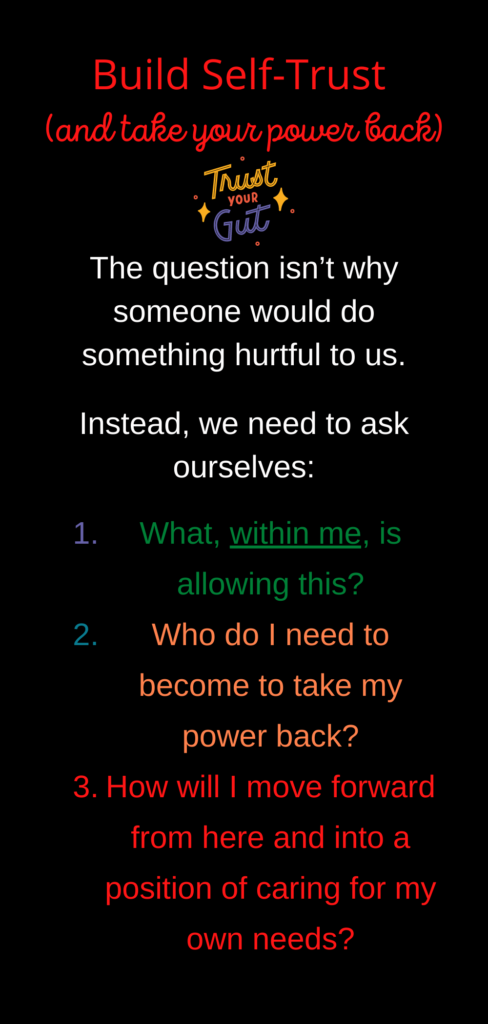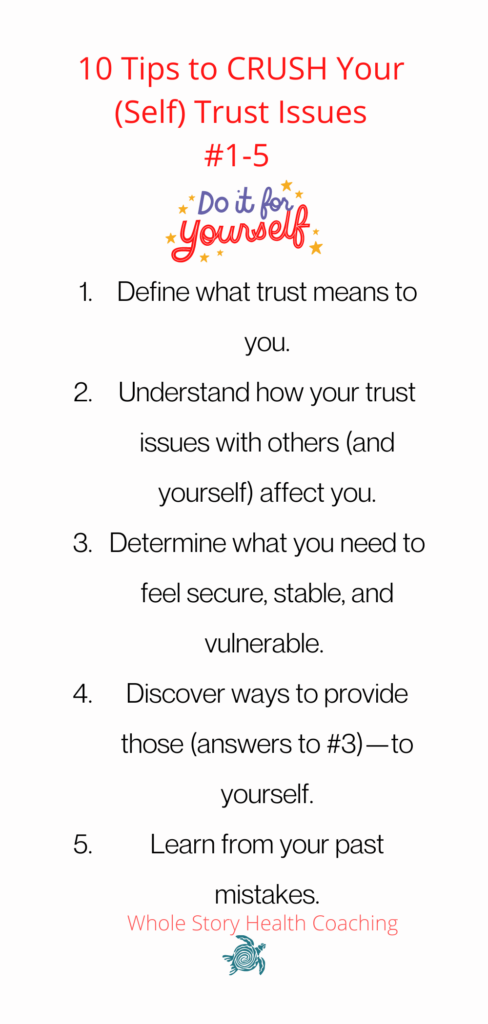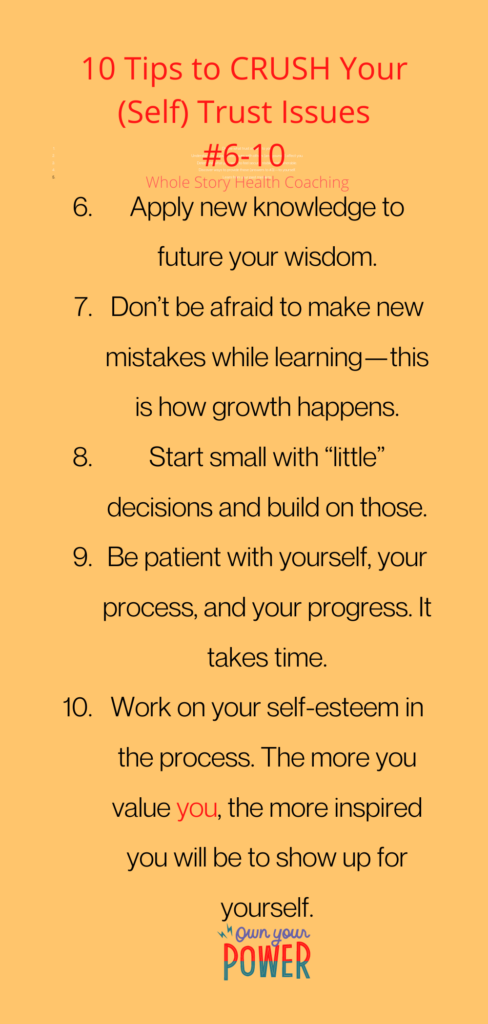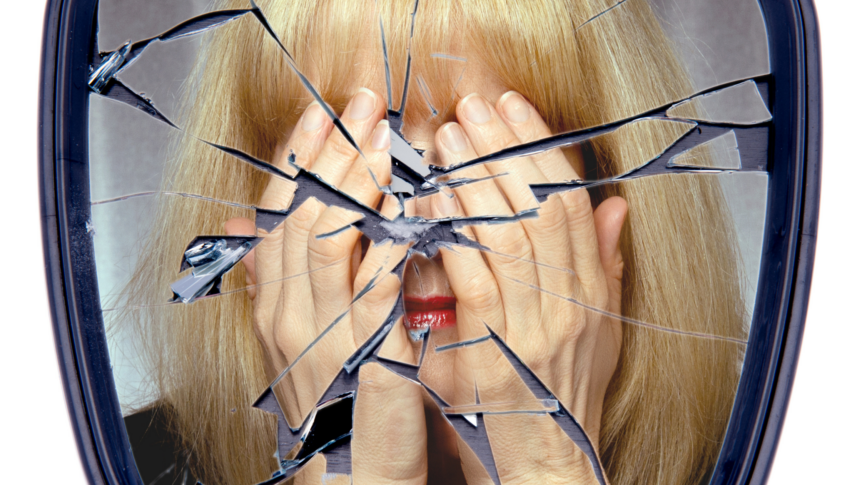Trust issues with other people is a common topic, but what about when we are the problem?
When we have a habit of letting ourselves down, it screams volumes to our inner being (and others) about how little we can expect of ourselves.
We lose credibility—within.
Little by little, we destroy our ability to rely on ourselves for our own mental, emotional, spiritual, and sometimes physical safety.
Over time, our emotions and minds keep track of the various choices that we’ve made and the outcomes.
A trail of poor choices can make developing the ability to trust ourselves incredibly difficult—especially when we can’t find a reason to.
The more unreliable I became—to myself, the more I accepted that I could not be trusted.
Char Aukland
In order to rebuild the lost trust, we will have to rack up a history of making some very tough decisions — and sticking to them.
Fortunately, when we are patient with ourselves and learn to become more self-aware, we can start to act in our best interest — with consistency.

The Dangers of Trusting Others More
“I trusted him…I don’t understand what happened”.
“Why would they do this to me? I’m a nice person.”
Before I learned better, I asked myself these very questions — in complete confusion.
What had I missed? And, more importantly, why was I repeating this cycle? Different people but the same scenarios.
Hindsight is 20/20. In looking back, I had:
- no natural defenses
- a desire to be accepted
- no confidence in my own decision-making
- low self-esteem
Combined with a willingness to accept (and overlook) red flags, those factors were a destructive mix.
Once we understand what someone is capable of, we need to incorporate that knowledge into our interactions with them. This is wisdom.
Too many times, we ignore red flags, hoping and waiting for the best…which is unlikely to come.
Repeatedly allowing ourselves to trust the wrong people, while blinding ourselves to reality, undermines our self-confidence.
It also conditions us to continue to hand over our power to others. This costly mistake can lead to us becoming:
- victimized
- misused
- mistreated
- self-loathing
- self-sabotaging
In the process, we lose confidence in our judgment and decision-making. We forfeit our instinct.
And to be clear— it’s us…not them.
(Self) Trust Issues Take Time to Develop and Heal
Though the Internet is filled with advice about how to recognize the red flags that toxic people display—I had become toxic—to myself.
The truth is that sometimes we are the enemy…the emotionally unhealthy person…the one who is sabotaging our own life.
Char Aukland
I was my own saboteur.
Self-sabotage can sneak into our lives without us ever realizing it is taking place.
We recognize what others may be doing to us but underestimate the role we are playing in our own takedown.
Self-sabotage shows up in different ways for different people. Below are just a few examples. We self-sabotage when we:
- compromise our values
- set ourselves up in situations that will result in failure
- repeat destructive patterns
- break commitments to ourselves
- destroy our own self-trust/instincts
- fail to set or violate our boundaries for others
Physically, mentally, spiritually, and emotionally, self-sabotage is an inner enemy that we must uncover, confront and eliminate.
Until we do, we will continue to undermine our efforts to move forward and build the self-confidence we need to end our dysfunctional patterns.
Unfortunately, we can end up at the mercy of the many predators lying in wait for an unsuspecting and defenseless victim.
So, the question isn’t why someone would do something hurtful to us.
Instead, we need to ask ourselves:
- What, within me, is allowing this?
- Who do I need to become to take my power back?
- How will I move forward from here and into a position of caring for my own needs?
What is Trust ?
In the past, I always thought of trust as a feeling. I’m not sure that I understood exactly what it meant to me.
By definition, trust is:
- assured reliance on the character, ability, strength, or truth of someone or something.
- one in which confidence is placed
- dependence on something future
- hope
No matter which definition we go with, we must have boundaries, standards, and our own value system on which to build a foundation of trust.
For me, learning and implementing this was a long, and sometimes painful process.
10 Tips to Help You Crush Your Trust Issues

When we start to learn how to make the right choices (using wisdom and good judgment), we will begin to establish a trusting relationship with ourselves.
With work, over time, the belief we have in ourselves will grow.
Use the following list to build a foundation of self-trust…and become someone you can rely on.
- Define what trust means to you.
- Understand how your trust issues with others (and yourself) affect you.
- Determine what you need to feel secure, stable, and vulnerable.
- Discover ways to provide those (answers to #3)—to yourself.
- Learn from your past mistakes.
- Apply that knowledge to future your wisdom.
- Don’t be afraid to make new mistakes while learning—this is how growth happens.
- Start small with “little” decisions and build on those.
- Be patient with yourself, your process, and your progress. It takes time.
- Work on your self-esteem in the process. The more you value you, the more inspired you will be to show up for yourself.



